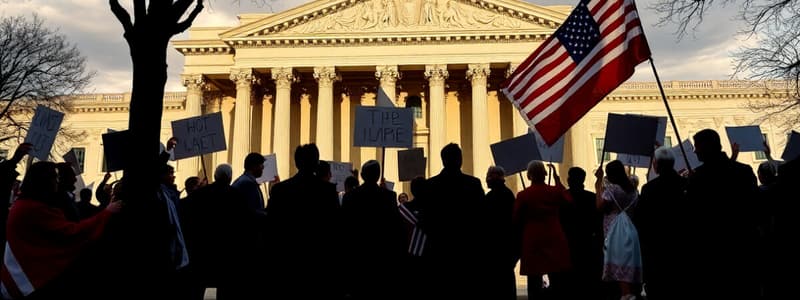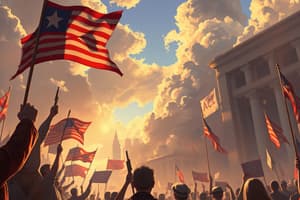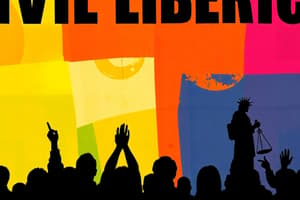Podcast
Questions and Answers
What does the term 'civil rights' specifically refer to?
What does the term 'civil rights' specifically refer to?
- Individual rights guaranteed by the Constitution
- Government actions addressing minority group legal status (correct)
- Personal freedoms that cannot be taken away
- The rights granted through the First Amendment
Which clause in the 14th Amendment is used to defend civil liberties?
Which clause in the 14th Amendment is used to defend civil liberties?
- Due Process Clause (correct)
- Equality of Opportunity Clause
- Liberty Clause
- Equal Protection Clause
What is 'prior restraint' in the context of civil liberties?
What is 'prior restraint' in the context of civil liberties?
- A law that suppresses free speech
- Excluding certain evidence from court
- Preventing publication of information by the government (correct)
- Censorship of symbolic speech activities
Which of the following best defines 'double jeopardy'?
Which of the following best defines 'double jeopardy'?
What does 'symbolic speech' entail?
What does 'symbolic speech' entail?
In legal terms, what defines a 'civil case'?
In legal terms, what defines a 'civil case'?
What is the primary purpose of 'affirmative action'?
What is the primary purpose of 'affirmative action'?
What does 'de facto segregation' refer to?
What does 'de facto segregation' refer to?
Flashcards are hidden until you start studying
Study Notes
Civil Liberties and Civil Rights
- Civil liberties are individual rights protected by the Bill of Rights.
- Civil rights are government actions to address the legal status of minority groups.
- The Due process clause of the 14th Amendment protects individual civil liberties.
- The Equal protection clause of the 14th Amendment extends civil rights to minority groups.
- Incorporation is the process where the Supreme Court applies the Bill of Rights to states on a case-by-case basis.
- Symbolic speech uses actions or symbols to convey a message.
- Prior restraint is government censorship of publications.
- Slander is a false spoken statement that damages reputation.
- Libel is a false written statement that damages reputation.
- The exclusionary rule prevents illegally obtained evidence from being used in court.
- A grand jury decides if there's enough evidence to indict and proceed with a trial.
- A trial (petit) jury hears a case and determines a verdict of guilty or not guilty.
- Double jeopardy prevents being charged with the same crime twice.
- Eminent domain allows the government to take private property for public use with fair compensation.
- A criminal case involves an individual or group accused of violating a law.
- A civil case is a non-criminal lawsuit between private parties.
- De jure segregation is segregation enforced by laws or rules.
- De facto segregation is segregation arising from patterns, trends, and history.
- Civil disobedience is peaceful protest against unjust laws.
- Strict scrutiny requires the government to prove a law is constitutional by serving a compelling interest and being the least restrictive option.
- Equality of results seeks to achieve the same outcome for everyone.
- Equality of opportunity aims to give everyone an equal chance to succeed.
- Affirmative action involves measures to favor disadvantaged or discriminated groups.
Studying That Suits You
Use AI to generate personalized quizzes and flashcards to suit your learning preferences.




